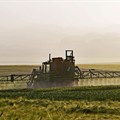Studies of three river catchments have found an association between pesticide exposure and poorer brain function in children...

Farm workers and their children are exposed to pesticides that have been banned in Europe. These pesticides remain in the environment, and studies have found them all year round in three river catchments in the Western Cape. Archive photo: Steve Kretzmann / GroundUp
- Two studies have found certain pesticides that are banned in Europe to be present in the Berg, Krom and Hex rivers throughout the year.
- Concentrations of these pesticides outside crop-spraying and high-rainfall months indicate the chemicals may also be in the groundwater.
- Health studies involving more than 1,000 children in these catchment areas have found an association between pesticide exposure and poorer brain function in children.
Pesticides that are banned by the European Union (EU) have been found to be present year-round in three rivers in the Western Cape, with indications the chemicals are present in groundwater.
An association between pesticide exposure and poorer brain function in children living in these three river catchments has also been found. This is in two studies by scientists at Stellenbosch University, the most recent published in April, and a separate study, led by the University of Cape Town School of Public Health, published in 2020. The studies all focused on the Piketberg, Grabouw and Hex River Valley catchments.
Pesticides
Studies of pesticide concentrations measured chemical compounds in the Berg River (Piketberg catchment), Krom River (Grabouw catchment), and Hex River.
In a study led by Stellenbosch University Department of Earth Sciences lecturer Reynold Chow, of water samples from these three rivers from July 2017 to June 2018, and from April to July 2019, researchers found levels of five pesticides and herbicides exceeding the European Environmental Quality Standards (EQS) at least once between June 2017 and January 2018.
The study noted the chemicals may have been more concentrated than usual because the sampling followed the severe drought of 2015 to 2018, when there was less water flushing the catchment area.
However, in a paper on the source of the pesticide contamination in these three catchments, a team led by Emma Davies found two of these five chemical compounds – imidacloprid and chlorpyrifos – exceeded EQS levels between February 2022 and March 2023, when there was normal rainfall.
Davies’s study also found two additional pesticides – terbuthylazine and spiroxamine – exceeded EQS levels.
Of the 44 pesticides for which Davies tested, 18 were detected in the Berg River, 13 in the Krom River, and eight in the Hex River.
Both Chow and Davies noted that imidacloprid was of particular concern as it was found across all three catchments, and was detected outside periods when pesticides are applied to crops.
Davies notes that “the frequent detection” of imidacloprid, a pesticide that attacks the nervous system of insects, in rivers is “concerning”, as it is banned in the EU due to “mounting evidence” that it harms pollinating insects such as bees.
“The sale and use of imidacloprid in South Africa highlights a provocative double standard, especially when the use of EU-banned pesticides are used to produce food (in South Africa) for the EU market,” states Davies.
She notes that according to The Perishable Products Export Control Board, nearly 40% of South Africa’s agricultural exports in 2022/23 were sent to the EU.
“This is a poignant example of how the EU externalises potential environmental and human health risks to food-producing developing countries.”
Groundwater contamination
Davies and her team found pesticide concentrations in the Hex River occurred in the off-season when spraying generally does not take place.
Additionally, the year-round presence of imidacloprid and terbuthylazine indicates a source other than run-off after agricultural application. Previous studies indicate groundwater as a possible source of pesticide pollution.
The four highest pesticide concentrations in the Hex River occurred in March, August and October. March is during the grape harvesting season (grapes constitute 73% of crop production in the Hex River Valley), and October is during the low rainfall period.
In Grabouw, consistent low levels of pesticides in the river during months when little or no pesticide were applied to crops also indicates groundwater as a source.
The study notes that the Hex River Valley and Grabouw aquifers do not have an impermeable layer of rock above them. Chemical compounds can therefore enter through leaching from the surface, and then feed into rivers.
Although studies of groundwater contamination in the Piketberg, Grabouw, and Hex River catchments were “very limited”, two previous studies in 2001 and 2003 detected endosulfan, a toxic insecticide chemically similar to DDT, in groundwater at all three sites. This suggests a risk of other pesticides also entering groundwater.
Davies and her team note that imidacloprid and terbuthylazine have high Groundwater Ubiquity Scores – a greater tendency to enter groundwater.
Conversely, pesticides with lower Groundwater Ubiquity Scores were not detected in the rivers during low rainfall periods or periods when pesticides were usually not applied to crops.
The study also notes that in France, terbuthylazine was detected in groundwater 17 years after being banned. It is still used in South Africa.
Consistent contamination from groundwater can lead to compounds exceeding Environmental Quality Standards, Davies and her team say. “For example, imidacloprid, which is potentially coming from groundwater, exceeded its EQS almost year-round in all three catchments despite few known agricultural applications.”
Health impacts
Research into headache severity and neurodevelopment of school children aged nine to 16 in the Piketberg, Grabouw and Hex River Valley farming areas was published in 2020.
Led by Dr Shala Chetty-Mhlanga from the School of Public Health and Family Medicine at UCT, the study involved 1,001 children who self-reported their exposure to pesticides on the farms where they lived and worked. This included the handling of pesticides, eating fruit straight off the tree, contact with surface water on the fields, and seeing and smelling pesticides being sprayed.
About 50% of the children, who were recruited from seven schools across the three areas, reported to have “been engaged in activities related to pesticide exposure”.
The severity of the headaches they reported suffering, states the study, “consistently increased in relation to pesticide-related farm activities, eating crops, and leisure activities of playing, swimming or bathing in nearby water”.
Tom Nederstigt and Martina G. Vijver 26 Feb 2024 Neurocognitive tests found that children involved in farming activities involving pesticide use generally struggled more with multi-tasking tests.
“Lower strategy in spatial working memory and lower paired associated learning was observed for those who pick crops off the field compared to those who do not pick crops off the field,” state the researchers.
Additionally, eating fruit directly from the vineyard, as opposed to washing it first, was associated with a lower motor screening speed and lower rapid visual processing accuracy score.
The study found that children who indicated they were involved in activities which exposed them to pesticides, might be at a higher risk of suffering from headaches and “lower cognitive performance in the domains of attention, memory and processing speed”.
The study notes that farmworkers are the most vulnerable population when it comes to exposure to pesticides, with children being particularly vulnerable as their organs are still developing.
Children are likely to engage in more hand-to-mouth activities; they have a larger food intake per unit body weight; they breathe in relatively larger volumes of air; and are more likely to play in hazardous zones.
The study concluded that although there was a reliance on self-reporting by the children, who filled out questionnaires, the results suggested long-term detrimental health effects among children exposed to pesticides.
Chetty-Mhlanga and the team also reference other studies that associate neurodevelopmental disorders such as Attention Deficit Hyperactivity Disorder (ADHD), poorer social behaviour, lower intelligence, and worse behavioural regulation with early exposure to pesticides.
Both teams of researchers note that South Africa is the largest user of pesticides in sub-Saharan Africa, with more than 3,000 pesticides registered. These include possible neurotoxic and endocrine-disrupting chemicals as active ingredients. Many of these chemicals and pesticides, against which Women on Farms Project protested recently at Parliament, are banned elsewhere in the world.
This article was originally published on GroundUp.
© 2024 GroundUp. This article is licensed under a Creative Commons Attribution-NoDerivatives 4.0 International License.


![By PMO - Ethiopia - [1], Public Domain,](https://biz-file.com/c/2509/787241-300x156.jpg?5)





































